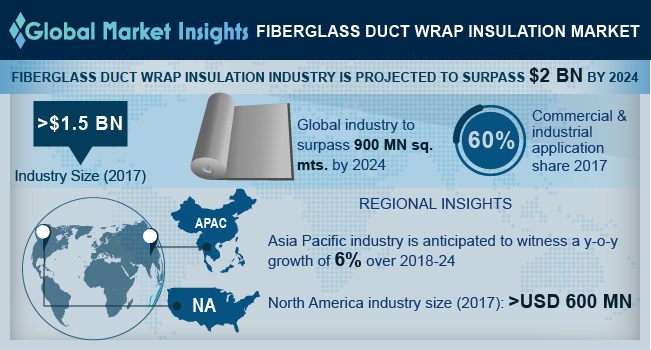Home > Construction > Construction Materials > Insulation Materials > Fiberglass Duct Wrap Insulation Market
Fiberglass Duct Wrap Insulation Market Size
- Report ID: GMI1768
- Published Date: May 2018
- Report Format: PDF
Fiberglass Duct Wrap Insulation Market Size
Global Fiberglass Duct Wrap Insulation Market size was worth more than USD 1.5 billion in 2017 and is anticipated to surpass 900 million square meters by 2024.

Shifting trend towards energy efficient solutions in construction applications along with robust growth in global construction industry are among the key factors driving the fiberglass duct wrap insulation market growth. Global construction output recorded USD 8.8 trillion in 2016 and is expected to surpass USD 10.1 trillion by 2021. Increasing adoption of air flow-based HVAC system in commercial as well as residential constructions will propel the industry growth.
Increasing consumer awareness pertaining to energy conservation particularly in the North America and Europe will support the industry demand. Rapid industrialization coupled with growth in construction of educational, offices, healthcare and institutional buildings will drive the fiberglass duct wrap insulation market. Rising consumer focus to maintain ambient environment particularly in commercial buildings will support the product demand.
Necessity for effective protection to reduce the HVAC leakages and enhance energy conservation has stimulated the product demand. As per Environmental Protection Agency (EPA), HVAC leakage causes up to 30% of the energy loses. Efficient thermal resistance for the operating temperatures ranging from 4 OC to 121 OC along with moisture resistance, improved performance in wet conditions will drive the fiberglass duct wrap insulation market.
| Report Attribute | Details |
|---|---|
| Base Year: | 2017 |
| Fiberglass Duct Wrap Insulation Market Size in 2017: | 1.5 Billion (USD) |
| Forecast Period: | 2018 to 2024 |
| Forecast Period 2018 to 2024 CAGR: | 6.5% |
| 2024 Value Projection: | 2 Billion (USD) |
| Historical Data for: | 2013 to 2017 |
| No. of Pages: | 250 |
| Tables, Charts & Figures: | 189 |
| Segments covered: | Type, Application Industry Analysis, and Region |
Inclination towards fiberglass in the overall insulation industry owing to its significant properties has enhanced the product penetration. High flexibility, easy installation, improved comfort control and enhanced condensation control are among major properties driving the fiberglass duct wrap insulation demand. Significant features including reduction in temperature interchange, enhancing moisture control and energy efficiency will stimulate the industry demand.
Regulatory compliance for the energy efficient HVAC systems due to increasing energy concerns will support the fiberglass duct wrap insulation market. Government initiatives to promote effective and sustainable technology for ventilation, heating and air distribution applications will fuel the product demand. According to Department of Energy (DOE), duct systems reduce energy consumption ranging from 25% to 40% with enhanced air distribution.
Fluctuating raw material prices along with sustainability trends are among key factors affecting the fiberglass duct wrap insulation price trend. Growing penetration of polymer-based products as a substitute is among major challenges for industry growth. In addition, stringent regulations on the released airborne glass wool particles caused due to lack of efficient binder may impact product scope.
